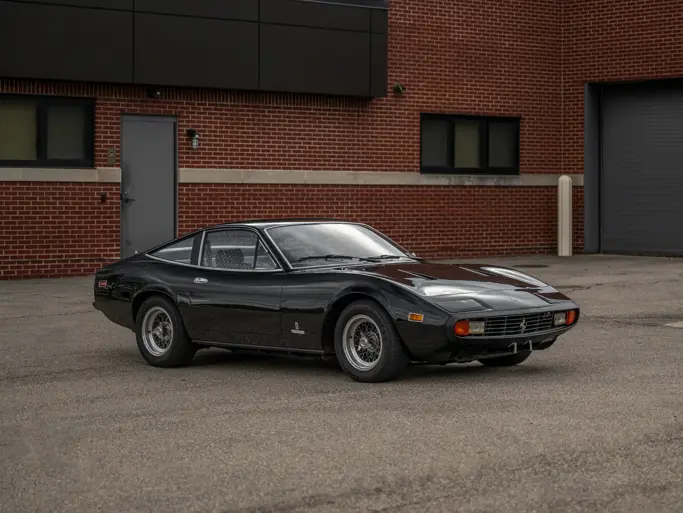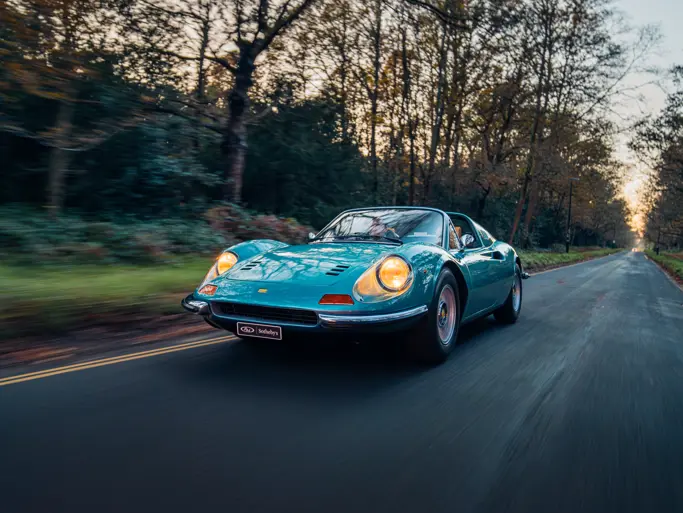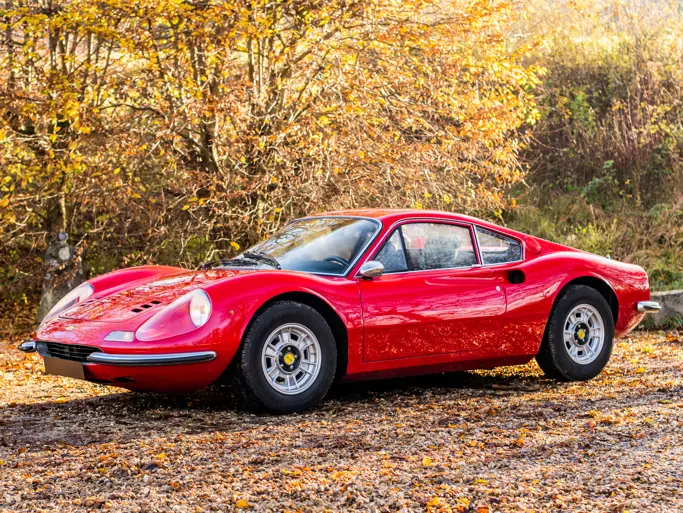
1972 Ferrari 365 GTC/4
{{lr.item.text}}
$315,000 USD | Sold
Chassis # 15181
{{bidding.lot.reserveStatusFormatted}}
- 4.4-liter, 320-hp V-12 DOHC
- Five-speed manual transmission
- Six Weber carburetors
- Known history
- Respectable driver that can be shown
- Mechanically strong
- Experienced color change in 1990s
- Has received proper servicing
- Nicely presented
- Ready for immediate enjoyment
While it is no secret that Enzo always developed road cars to fund Scuderia Ferrari racing efforts, the company had a vested interest in appealing to a wide variety of clientele. While never straying from two-door, sporting designs, the company did have the foresight to add rear seats, and so the Ferrari 2+2 as we know it today in the FF or 612 Scaglietti, comes from a long history of important cars. The 365 GTC/4, the “4” denoting the number of camshafts, was introduced in March of 1971 at the Geneva Motor Show. Much like that of the Daytona, it was one of the first Ferraris to clearly have been influenced by the newly installed wind tunnel at Pininfarina. The era of the wedge-design was upon the car world and Ferrari was leading it with flowing lines and Italian flare.
Ferrari would build 505 examples of this model, but only 180 would be distributed for the U.S. market. These U.S. specification examples, easily defined by their two distributors, would have a touch less horsepower than their European counterparts at 320-hp. The 365 GTC/4 shared much with the Daytona, but had technical and a design adjustments to conform to its 2+2 purpose. It received a five-speed gearbox to replace the Daytona transaxle, the ubiquitous Weber downdrafts were moved to the side to adjust for the low hood line, and the overall wheelbase was stretched to accommodate two very small adults. This Ferrari is commonly regarded as a complete package and an epic 2+2 of the 1970s that has always attracted true enthusiasts.
The example on offer, a 1972 Ferrari 365 GTC/4, Chassis # 15181, according to factory records provided through a Marcel Massini Report, was completed in January of 1972 and was issued assembly sequence number 241. It left the factory destined for Bill Harrah’s Modern Classic Motors, in Reno, Nevada as a Blue Ribot over Blue Connolly example. It was reported to have sold new to Francisco Mir’s Ferrari Service & Diagnosis Center of Santa Monica, California. By 1975 it was traded to a J. Richard Camp of Chicago. It lived with Mr. Camp until the mid-1980s, by which point the color, like most Ferrari’s having lived through the 1980s was changed to Red, and the interior switched to black, the colors it still wears today. Shortly after, in 1987, it was in the hands of well-known purveyor Ed Waterman of Florida and offered for sale at this time. It soon made its way back to the west coast with California-based owner Mark Cilani with mileage at this time reported as 22,000; original.
Mr. Cilani eventually sold the car and by 1998 it was reported to reside in Canada with a Michael Champiss. It was regularly shown at the Ferrari Vintage Concours in Carmel Valley, California and later at the newly named Concorso Italiano in 2001. Mr. Champiss would own the car until 2015. During its stay in Canada we know that the car was well tended to by Marque expert Joseph Phillipovich of Prancing Horse Inc. located in North Vancouver. While in Mr. Phillipovich’s care it was regularly serviced and anything needing adjustment, replacement or tending to was completed promptly. We do know that it recently received new tires, total fluids and filters change, rebuilt rear shocks and everything confirmed as in order.
While the car has been previously described in its Ferrari Market Letter adverts of the early 1990s as “restored” it appears to be more of a good car that has never been restored fully. Rather it has been repainted in the lovely and fitting shade of red we see today and the interior re-trimmed in black, both of which were done in or around 1990. The paint however could have easily been updated in the past 10 years as it has a wonderful consistency and reflects that of a very respectable driver that could be shown. The car is straight down the sides with excellent panel fitment throughout. The stainless and chrome trim items all show nicely with minor blemishes (if any) and the rubber is newer throughout and in good order. The only items standing out are that of a cracked passenger side foglight, one hardly noticeable inconsistency in the front rubber bumper and the color of the wheels is not quite what it should be. The windshield has a small wiper mark as well, but is the original. These are all extremely minor items that if untouched would make no real difference in the presentation of the car and are nominal for a stellar driver and a 40-plus year old car. The one item that needs to be disclosed in reviewing this examples cosmetic condition is that of the passenger rear fender. It shows a very faint outward crease and paint meter’s slightly higher over the wheel arch than elsewhere on the body. Through close inspection we have determined that there must have been a small dent or scratch at one point that was corrected but has not stood the test of time. While we believe in full transparency of any items we find, it should also be noted that the blemishes noted are a result of extreme “nit picking” and the car could be respected and enjoyed for years in its current presentation.
The interior while re-trimmed in black shows very well and was done long enough ago that it has an aura of originality to it even though it is not with supple leather showing just the right amount of patina. The interior presents correctly overall with an original headliner. Everything works correctly with the exception of the fuel level gauge which reads intermittently. All knobs, switches, buttons, pulls and other accessories are in correct working order and are original to the car. The original Becker Mexico cassette player is present and the glovebox still holds an owner’s manual. Ultimately, a fantastic place to spend a Sunday afternoon, certainly in no need of attention for the onlooker considering an excellent driver that will function, be comfortable, and present nicely when shown off.
The engine bay of a Ferrari is always an overwhelming experience, but it is a nice sight to see six Weber side-draft carburetors packed into the engine bay of a GTC/4. The engine bay is perhaps not perfect per FCA standards, but it is close and obviously well cared for. Many of the correct style clamps are present along with crinkle coated finishes where they should be. Seals, filters, belts, hoses and various items all have a freshly serviced or new look with nothing standing out or in need of attention. The only item the eye is drawn to is the ignition system which has been updated to a more reliable and better performing MSD style. This is a simple bolt-on/bolt-off upgrade that could be reversed if desired, however a very smart upgrade for those intending to regularly drive this GTC/4.
As with any car, the underside can define the car or its history, how it was cared for and the reality of condition in the present and past. The underside of this GTC/4 is consistent with the rest of the car, not perfect, but not in need of any attention to be enjoyed in its current state as a driver. The structure, chassis and accompanying suspension components are all straight and solid with no evidence of any previous accident damage or rust issues. The exhaust system is older but in good order and the rear shocks appear to be recently restored (by Koni) as previously noted. Everything appears serviced overall and relatively clean for a driver. There is some leakiness in a few places expected of 42,000 mile Ferrari but nothing that would prevent one from a multi-100 mile journey of any kind. There is room for improvements but they are not required immediately. The rockers are the originals, and are straight and many factory welds and seams are still obvious throughout. In total, a respectable underside that is consistent with both the cars condition and history.
The driving experience, as with any Ferrari, is what instills the emotion that keeps us car enthusiasts going flat out. This example is no exception. It starts easily, and runs strong showing a minimum of 50-60 pounds of oil pressure at idle once warm. The temperature never rises above 190F and everything is responsive and in correct working order. The absolute only complaint we have is the typical 365 mid-range stumble at 2,800-rpm. Switching the main jets to a marginally larger size may very well solve the issue. It is very common on these side-draft Webers and often an issue on many of these cars. Beyond this; power is plentiful, strong, and the noise to match is symphonic. The hydraulic operation between the clutch, brakes and power steering are all in order and the shifting is smooth and precise.
Hailed as the best sounding, road-going Ferrari of all time, the GTC/4 was the transitional 2+2 that brought Ferrari into the modern day with breakthrough wind tunnel developed designs. It was the first Ferrari to feature adjustable ride height suspension (rear) and it claimed the highest price tag in period for a luxury GT sports car. A true “wolf in sheep’s clothing,” the GTC/4 is an obvious necessity for any serious Ferrari collection or enthusiast looking to spend half as much on a “Daytonaesque” experience. Complete with spare, manual, and a Marcel Massini Report, chassis # 15181 is ready for immediate enjoyment.


 | Auburn, Indiana
| Auburn, Indiana


